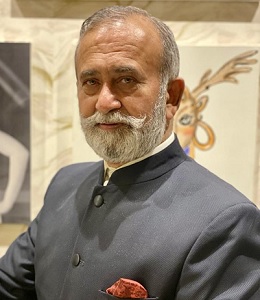INTERVIEW–ANIL PURI, CHAIRMAN, APS GROUP
Tracing the rise of Anil Puri and the APS Group
APS Group, which is now a leading Integrated Service Provider of India, had a humble beginning. The vision & perseverance of one man changed the shape of several industries. What seemed as an obsession at one point in time, is now a reality! This all started from a tin shed office & a Vespa scooter & a passion to provide solutions for problems. APS Group has been serving more than 1000+ clients ranging from diverse businesses like Banking, Financial, Manufacturing, IT/ITES, Logistics, Healthcare, Education & many more.
SECURITY TODAY interacted with Mr Anil Puri, Founder and Chairman of the Rs. ____ Crore APS Group to trace it’s rise and what he perceives as the future of the industry.
Early Days
I always had that entrepreneurial streak about me. I was never the good student type. In 1975-79, I spent some time in a village in Madhya Pradesh and decided to take up farming. Those were the times when middlemen used to be involved in selling the produce of farmers. The farmers were taken advantage of. I beat the system. I decided to change that and started the process of selling my produce myself.
This served as a new way for the farmers in the village since they got the benefit of earning directly from what they produced. Subsequently, when I was only 17-18 years old I also started a stone crushing and brick kiln unit in close coordination with my relatives. then. The nature of the business was such that it got me close to undesirable elements, as this was a business where security was always an issue and managing it was a challenge that I learnt early in my life. It required roughing it out. I also helped the family business in PWD contracting, where I had to deal with government people. Subsequently because of security risks, my family recalled me back to New Delhi where I took to studying hotel management. After the course I worked within the Taj group of hotels as a chef for 4 years and that entrepreneurial streak ensured that I could not do that for long.
My father after retirement from the armed forces had joined the State Bank of India as an advisor on security in eastern India. It was in 1984 that we started our manned guarding services business. In those days there was no concept of minimum wages and one could demand whatever rates you deemed fit for the security services you rendered. There was no calculation of what wages you were going to ask for in those days. But I was certain of one thing, that my guards got paid on time and that has never been compromised till now. Simply because the chap you deploy is also safeguarding your name and name of the company, so he has to be secure. We started off with some 48 guards in the company at Dharuhera in Haryana. Today we are a 30,000 strong guarding company, serving ______ clients across India.
We were also possibly the first private security agency to ensure ESI and PF registration for our staff. This ensured that the loyalty of our team stayed with us, as the APS group expanded its wings. We were also the first to start the process wherein the salaries of the guards were paid directly in their bank accounts. This ensured complete transparency of the transaction. For this it was required that we become computer friendly. In 1992 we carried out the complete computerization of our company payroll processing. I hired someone who was savvy in this and that person is now my CEO. I simply asked him what I wanted and since he knew computers, he delivered. Initially we had it all figured out on an excel sheet, how many guards, their working hours, and salary to be paid was calculated automatically down to the last penny. Since I disbursed the salaries myself to each guard myself there were no middlemen involved. This ensured that the guards were paid exactly as per their computed salaries.
Cash-In-Transit (CIT) business
Since we worked a lot with banks, way back in 1989 we realised that they needed cash vans to transport their cash. Because in banks, whenever money was to be sent to RBI, the bank’s gunman had to go with money in a taxi. As we used to provide guards and gunmen to Grindlays Bank, we told them we would provide a cash van along with the gunmen to move their money. Subsequently of course we provided further security features in the van. So a lot of banks came in to use this new service. That’s how we entered the cash van business and Securitrans came up. We would provide both the cash van service and gunmen for the banks to transport the money.
When we started working with HDFC bank in their early days I created a white paper for the banks on best practises in moving cash. Effectively we were providing them with security solutions along with the cash vans and gunmen. Writing the white paper wasn’t easy, but it was an awesome way to stand out as an expert in your field, this white paper got us premium respect from the banks. Most other banks followed HDFC, as it also expanded its network of branches. We even created a van that could handle gunfire from an AK47 rifle…with armoured plating and all, we were the first private cash van company to do so! We built it, had it tested and used it on the road effectively. In fact during this time our focus moved from manned guarding business to the cash in transit business.
We started working for a large Swiss company where we started moving bullion around. We were responsible for bringing in and managing the distribution of gold and diamonds in India. For this we created 14 vaults across the country. Our USP was a quick and safe delivery of high value shipments within the set deadlines. We had built our system processes to suit the demands and requirements of our customers. What is important here is that we were able to even break into the ‘Angadia’ business which was a tough call!
Brinks Arya and we were the main players in this business at that time. Group 4 came in later, but was unable to compete in this kind of business so they exited, and their business came to us.
That time self insurance was the only insurance we had, as private insurance companies had yet not evolved. Relying on insurance to cover your risks was impossible as the process was mired in too much detail, so you built your own operational workflows that resulted in minimal losses. The biggest currency loss which we faced was to the tune of INR 6.3 millions, even as we, with the help of the police, were able to recover INR60 lakhs. This happened at an ATM because in those days ATM security was lax. Moreover, it took years before one could hope for insurance companies to settle your claim. However, now with foreign companies entering India the insurance services are a lot more client friendly and better organised to serve the cash-in-transit sector. A lot of security companies also started entering this market, and in their pursuit of grabbing market share they started quoting lower rates to banks, which also meant shoddy processes, reduced security and heightened risk. As they compromised and had to suffer.
Subsequently in 2011, just when the CIT business was becoming difficult to manage, with banks bringing in penalty clauses and taxing compliance demands, Securitrans was divested to Blackstone via CMS (the CIT company) for about INR 250 Cr., and that was the time that we started concentrating back on growing our manned guarding business.
I always say that in the security industry you are always riding a tiger. You can either sit firmly on its back and manage it effectively and profitably, or hang on to its tail and be ready to get tossed around, because letting go will cause you hurt (losses).
Managing to grow constantly
The mantra is not to allow your company to gather flab, because if you do that, it becomes difficult to shed. You may end up losing somebody who has been with you long and has been an asset in the past, this also has an adverse effect on people left behind. It may also give rise to insecurity. It will prevent others from giving their best. We never allowed that. We always had a compact setup, so much so that sometimes we feel we are a little short on the top management lineup. But it is better to be short, than be overweight. This is essential, especially in the manpower intensive industry where you today have to be extremely competitive on pricing.
It is necessary as a team leader to stay humble and have the ability to hold the team together. This ensures that when you grow and the company grows, the team grows as well. This is a crucial leadership skill that should be kept in mind. Good leadership combines numerous aspects. The very fact that you can build a team, hold them together is one of my biggest abilities. You have to win their respect and give them the due respect. Then they will go an extra mile to deliver for you.
Growth into technology
We are now investing a lot in technology…machine learning and AI. We have set up a Command & Control Centre. We are also involved in the remote monitoring service although we entered this sector late. That was deliberate because we saw the IT companies moving into remote monitoring. But we knew they were not going to last. Because an IT company does not have the measure of the field, and feet on the ground. Even though we were asked long before to render these services, we knew we were not ready. What happened in the cash-in-transit sector was happening here too with companies bringing down prices in their hunger to grab a contract. Not realising they had no choice but to compromise on security.
Now we have entered this business because customers have matured, they realise what these things will cost them. These are clients and companies that are careful of their reputation and demand quality of service, and that will mean some investment. But the company has now grown in technology. Security is never along a set path, it is built on an evolving approach. You need to understand the requirements of a client and build your processes around it, so as to deliver efficiently on time. You need to give a security solution to a client which is economical and yet effective. If you help the client save costs and grow, you will always grow along with him. If he achieves his goals, you will also achieve your own goals.
The importance of training
We are putting in a lot of effort in training because when you go to a client’s premise, you see my security guard and assess my company from his attitude and behaviour of the guard, which in turn comes from the training we impart. When we started our training centres they were meant for our own staff but down the line we realised the fact that there will be other players in the field and if they don’t do well, they will give the whole industry a bad name and you too suffer. It is very important to have a full fledged training vertical since that’s where the knowledge is created. We not only used this vertical for our own staff but even offered the service to our clients. As we work a lot with banks who have multiple vendors, we told them we have a training centre and you can send all your vendors’ staff there for training. They accepted this offer as training is a constant process. By setting up this vertical and opening it for others to benefit from, we shared our knowledge which is very important to do for growth of the industry. I’m not scared to share my learnings or my training facilities, as it is in sharing that everyone grows, and you grow as well.Collaborative growth is essential for the private security industry to grow. That’s when the industry earns respect.
Managing facilities of our customers has been our hallmark
___________
____________
The impact of Covid-19 on business
It was a huge challenge. There was limited information and everyone was scared. Handling fear was the key during that time. You see, this was a fear of the unknown which is always difficult to wish away. We carried out a massive awareness campaign on what needs to be done and what should be done. Fears had to be overcome. Digitally via phones these awareness videos were shared with guards in local languages – How to wear a mask, how to use the gloves, properly sanitise your hands …all the dos and don’ts, and how to ensure compliance, amongst others. All this had to be explained to our guards gently but firmly, and not as a dictat. Then they feared their families which also had to be dispelled to ensure that the guards came to work and performed without anxiety. I am happy and proud to say that we did not lose a single employee through the first or second waves of Covid-19. The awareness campaigns worked well. We gained employee trust during this time which is always very important.
The Top 3 sectors that we serve
We do serve a lot of sectors with our security services and solutions but the main three would be Banking, IT & ITES, and Industry. We have broad based our approach along all industry types. We are now expanding our role as a security specialist.
Giving back to the industry
I am a member of quite a few industry associations, such as CAPSI, ASSOCHAM, and _____. I try to share knowledge and experiences with others. I have begun to write educational articles on security issues where I don’t talk about my company but about security trends in general. I had researched a lot on various issues like school security which I shared. I also remember there being a lot of confusion about multiple government notifications on various issues across the country, so I put all notifications together to create a repository where people could find the information in one place. I translate them into a language where everyone can understand it. See, sharing this knowledge is not a problem for you… rather, I enjoy it. These are the things that I feel I need to do to help the industry grow. You have to grow collaboratively, you can’t grow in silos.
On funding the growth
We have offers from several local investors. There are also some foreign investors ready to invest in India waiting for the rules to relax. But the question is when you deal with them, you have to build value for the investors.
The future of the industry
There are multiple opportunities in the industry. But it is necessary to adapt to the changes coming up. Technology is moving at a rapid pace. A situation is developing wherein if you don’t adapt to the changes you will not achieve your goals. The growth is going to be steady in the industry. There will be shakeouts and there will be consolidations. Situation is already reaching where the sector will have a significant amount of overseas investments. FDI will open up and there are huge opportunities coming up and the national economy grows. Organisations delivering quality and long term vision with sustaining ability will certainly do well. The name of the game is ‘manpower and technology’ rather than ‘manpower versus technology’. Technology will mean leveraging a lot of AI and ML. The market is maturing, you can’t cut corners where compliances are concerned. There are a lot of projections about growth, I anticipate a 25 percent CAGR over the next few years .








